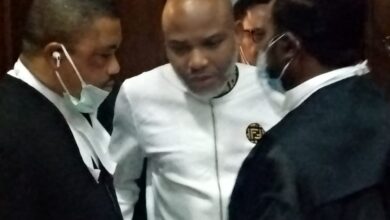
A controversial musician, Azeez Fashola, better known as Naira Marley, has been arraigned before the Lagos State Special Offences Court at Oshodi over violation of lockdown order.
The controversial musician was earlier detained by the state police for flouting movement restrictions following a concert staged in Abuja in June.
A spokesperson of the state police command, Bala Elkana, told reporters that the singer was charged for violating the COVID-19 order banning interstate travels, which was at that time put in place to curb the spread of the novel coronavirus.
He is arraigned alongside his Manager Seyi Awouga on one count charge of breach of cessation of movement and interstates travel order made by the President of the Federal Republic of Nigeria under Regulation 4(i) of the Lagos State Infectious Disease Emergency Prevention) Regulation No 2 of 2020 and committed an offence punishable under Section 58 Public Health Law, Ch. P16, Laws of Lagos State 2015.
The two accused persons pleaded guilty to the charge and were awarded a fine of one hundred thousand naira each by the presiding magistrate.
In April, Marley was detained alongside Funke Akindele, a Nollywood actress, after the latter hosted a house party that the former attended, despite Lagos’ lockdown measures at the time.
The charges against him were, however, withdrawn following his apology to Babajide Sanwo-Olu, Lagos governor, where he promised to abide by all government measures thereafter.







